The article presents ten digital marketing strategies that hotels can implement to effectively boost bookings. It underscores the significance of:
Each strategy is backed by evidence demonstrating its effectiveness in increasing visibility and driving reservations, making a compelling case for their adoption in the competitive hospitality market.
In an increasingly competitive hospitality landscape, hotels must adopt innovative marketing strategies to capture the attention of potential guests. By leveraging data-driven insights, personalized experiences, and engaging content, accommodations can significantly enhance their booking rates and guest satisfaction. However, as the digital marketing landscape evolves, the challenge remains: how can hotels effectively navigate these strategies to stand out and thrive? Furthermore, this article explores ten essential digital marketing strategies that can help hotels boost bookings and elevate their presence in the market.
Data analysis stands as a fundamental pillar for accommodations aiming to boost reservations and elevate visitor experiences. By leveraging insights derived from reservation trends and guest feedback, accommodations can tailor their offerings to align with customer preferences, thereby enhancing satisfaction and fostering loyalty. Tools such as Google Analytics and advanced CRM systems are indispensable for , empowering establishments to refine their promotional strategies effectively.
For instance, those employing predictive analytics can witness revenue growth of up to 10%, as they adeptly adjust pricing and promotional tactics based on real-time demand forecasts. Furthermore, successful campaigns frequently harness data to segment audiences, facilitating targeted promotions that resonate with distinct traveler demographics. This approach not only heightens visibility but also encourages direct reservations, which can yield significantly greater revenue compared to third-party platforms.
Additionally, during staffing transitions, Lights On's Revenue Management Team can provide temporary support by optimizing pricing and promotional strategies, ensuring accommodations sustain momentum in their booking endeavors. By cultivating a culture that embraces data-driven decision-making, accommodations can consistently refine their marketing efforts.
As a practical recommendation, consider instituting a routine review of your data analytics to uncover trends and adapt your strategies accordingly, ensuring you remain competitive in a rapidly evolving landscape.
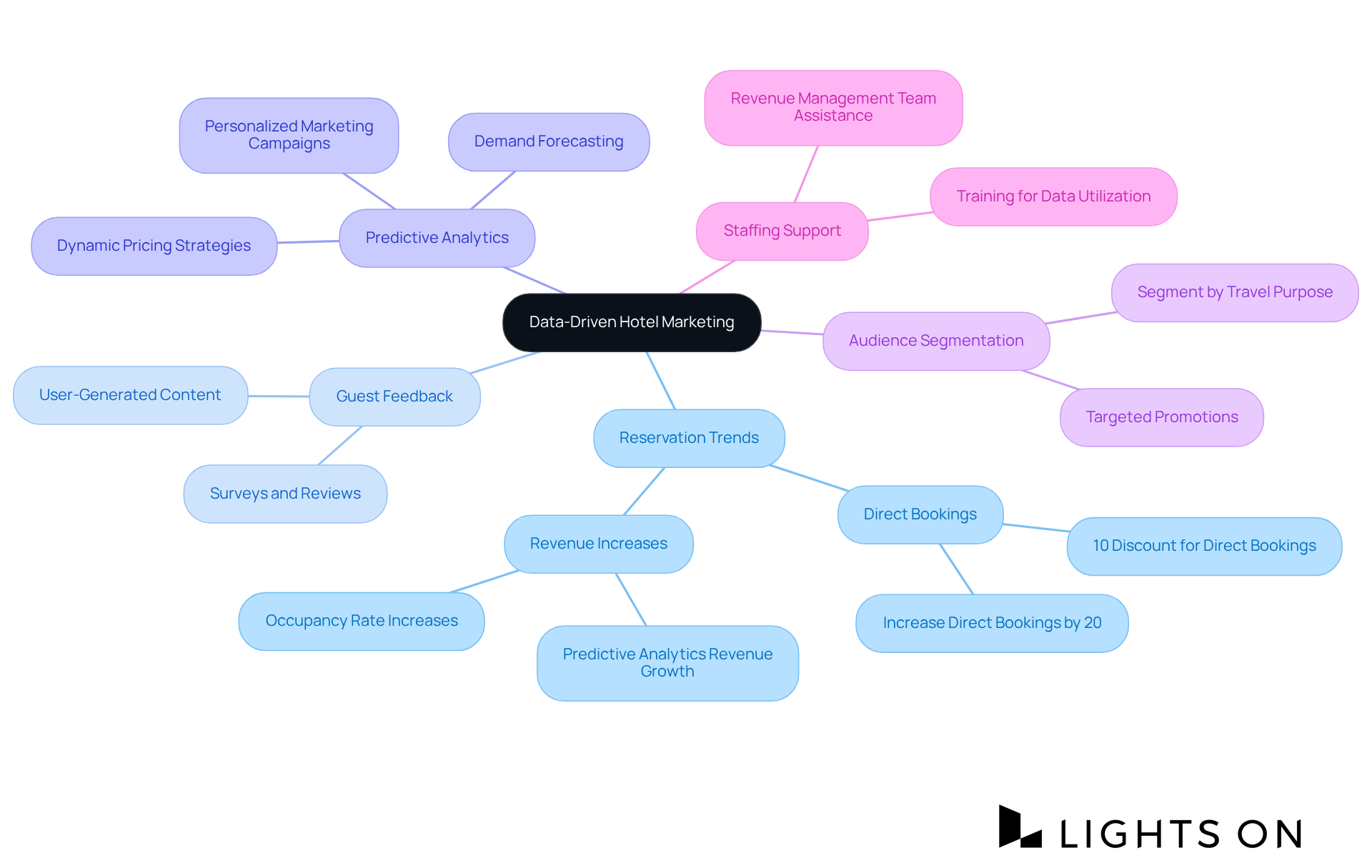
In 2025, ensuring that your hotel website is is no longer optional; it's a necessity. A flexible design that adjusts to various screen dimensions significantly enhances user experience, facilitating navigation and the completion of reservations for potential visitors. Essential aspects to incorporate include:
Furthermore, integrating mobile payment alternatives can elevate the reservation experience, encouraging additional patrons to finalize their bookings while on the move.

To enhance your establishment's online visibility, it is imperative to prioritize the optimization of your website for search engines, with a strong emphasis on . Given that 46% of all Google searches are for local businesses, utilizing pertinent local keywords and producing high-quality content that resonates with prospective visitors is crucial.
Implementing these strategies not only enhances your visibility but also positions your establishment as a trustworthy option for travelers seeking accommodations in your area.
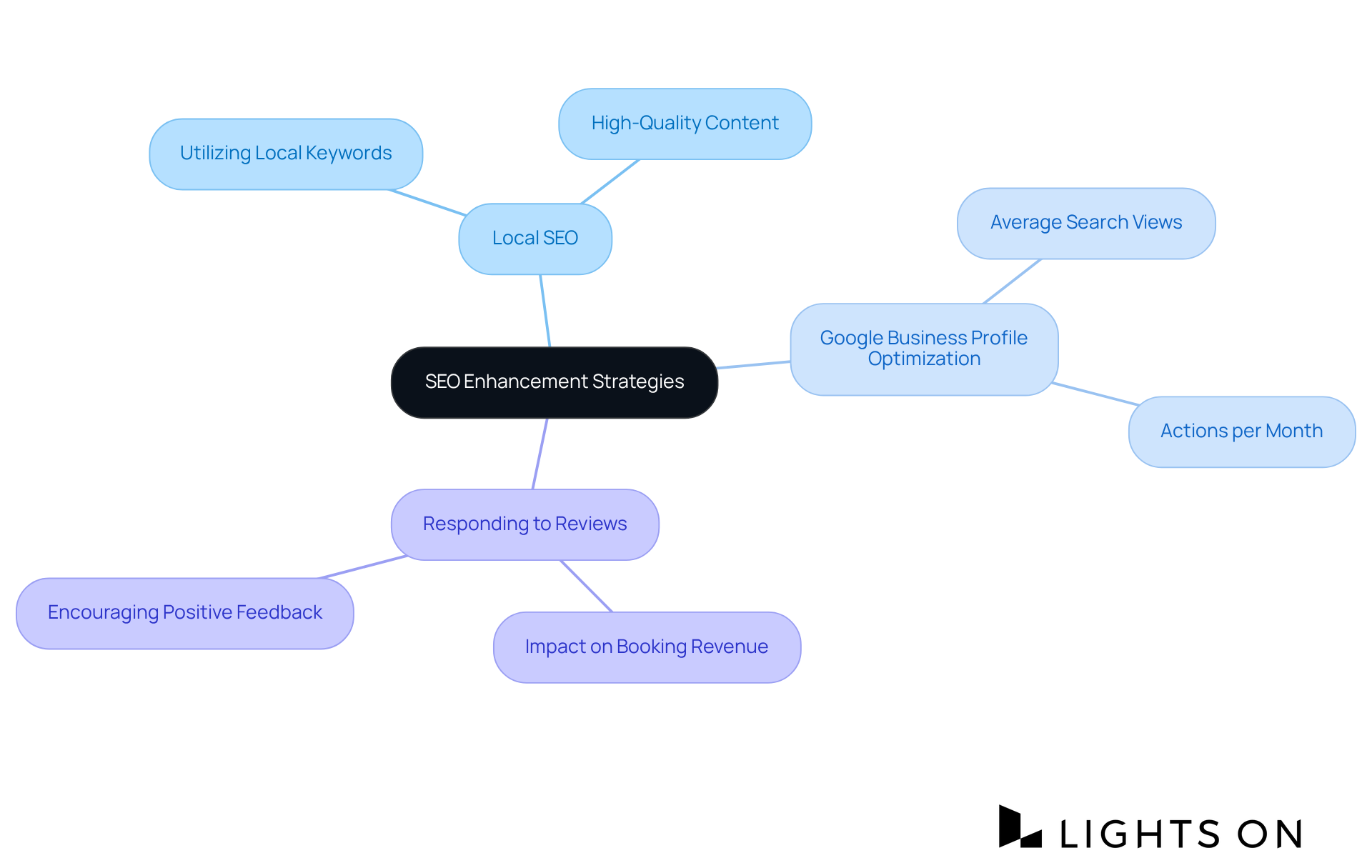
In 2025, personalization has evolved from a luxury into a fundamental necessity for accommodations. This shift underscores the importance of effectively utilizing visitor information to create personalized experiences that resonate with individual preferences.
Furthermore, implementing robust CRM systems allows establishments to meticulously track visitor preferences and behaviors, enabling them to anticipate needs and enhance the overall visitor experience.
Research indicates that while 61% of consumers are willing to pay extra for a tailored experience, only 23% report high levels of personalization after their stays. This disparity highlights a significant opportunity for enhancement. Such personalized interactions not only elevate guest satisfaction but also cultivate loyalty, significantly increasing the likelihood of repeat visits.
As Andrew Custage from Medallia notes, brands encounter challenges in capturing and understanding customer data swiftly enough to act on it. Thus, are essential for achieving the desired level of personalization.

Short-form videos on platforms like TikTok and Instagram Reels are revolutionizing marketing strategies for accommodations. These dynamic videos allow establishments to showcase unique features—such as room tours, dining experiences, and local attractions—in a visually captivating manner. Engaging content not only captures the attention of potential visitors but also motivates them to make reservations. In fact, video content generates 1200% more shares than text and images combined, establishing it as a powerful tool for enhancing visibility.
Furthermore, leveraging user-generated content (UGC) significantly enhances authenticity and trust, as 69% of consumers place greater trust in influencers compared to direct brand messaging. By encouraging visitors to share their experiences, accommodations can foster a sense of community and nurture deeper connections with their audience. For instance, Meliá Hotels International effectively utilized TikTok to highlight their properties from the guests' perspective, achieving impressive engagement rates and boosting brand visibility.
To maximize the impact of short-form videos, accommodations should prioritize that resonates with their target audience. Posting consistently—every 3-4 days—can keep the audience engaged without overwhelming them. As competition for attention on these platforms intensifies, remaining adaptable and responsive to emerging trends will be crucial for establishments aiming to increase reservations through effective visual promotion.

Producing valuable content that resonates with your target audience is essential for effective hotel marketing digital of accommodations. Engaging blog entries that cover local attractions, travel advice, and behind-the-scenes insights into your establishment can position it as a trusted resource. This strategy not only fosters connections with potential visitors but also enhances .
For instance, accommodations that highlight local guides and activity suggestions through their blogs have seen a 22% increase in room nights reserved, demonstrating the effectiveness of such content in driving engagement and reservations. Furthermore, incorporating hotel marketing digital strategies along with SEO best practices into your content strategy is vital; optimizing for long-tail, geo-specific keywords can attract more qualified traffic, leading to higher conversion rates.
In addition, with 80% of global travelers preferring to book their trips online, establishing a robust digital presence is crucial. By delivering relevant and valuable information, accommodations can position themselves as landmarks within their locales, ultimately boosting reservations and enhancing visitor loyalty.
Insights from Lights On Digital emphasize that implementing successful hotel marketing digital strategies for accommodations can significantly enhance reservations and revenue management, making it imperative for property owners to adopt such methods.

Email marketing serves as a crucial strategy in hotel marketing digital for accommodations aiming to reconnect with past visitors and boost repeat reservations. By adeptly segmenting your email list according to preferences and behaviors, you can craft personalized campaigns that resonate with your audience. For instance, delivering tailored promotions, reservation reminders, and post-stay follow-ups ensures your hotel remains top-of-mind for visitors.
Furthermore, automation tools significantly enhance your email outreach efforts, enabling timely and relevant communications that engage guests throughout their journey. With increasing open rates by 26% and email marketing generating an average ROI exceeding $40 for every dollar spent on basic platforms, the opportunity to drive bookings through well-executed email campaigns is substantial.
Additionally, hotel marketing digital strategies such as automated email campaigns can substantially elevate income and loyalty for accommodations. Emphasizing the importance of hotel marketing digital, particularly through customized email campaigns to retarget past visitors, can lead to increased loyalty and higher occupancy rates.
To optimize efficiency, hotels should promote email sign-ups during the reservation process or at check-in to grow their subscriber list. Moreover, maintaining a solid sender reputation is vital for ensuring that marketing messages successfully reach recipients' inboxes, ultimately enhancing the effectiveness of your email marketing strategy.
Consider offering exclusive discounts or loyalty points for subscribers to further incentivize sign-ups and engagement.
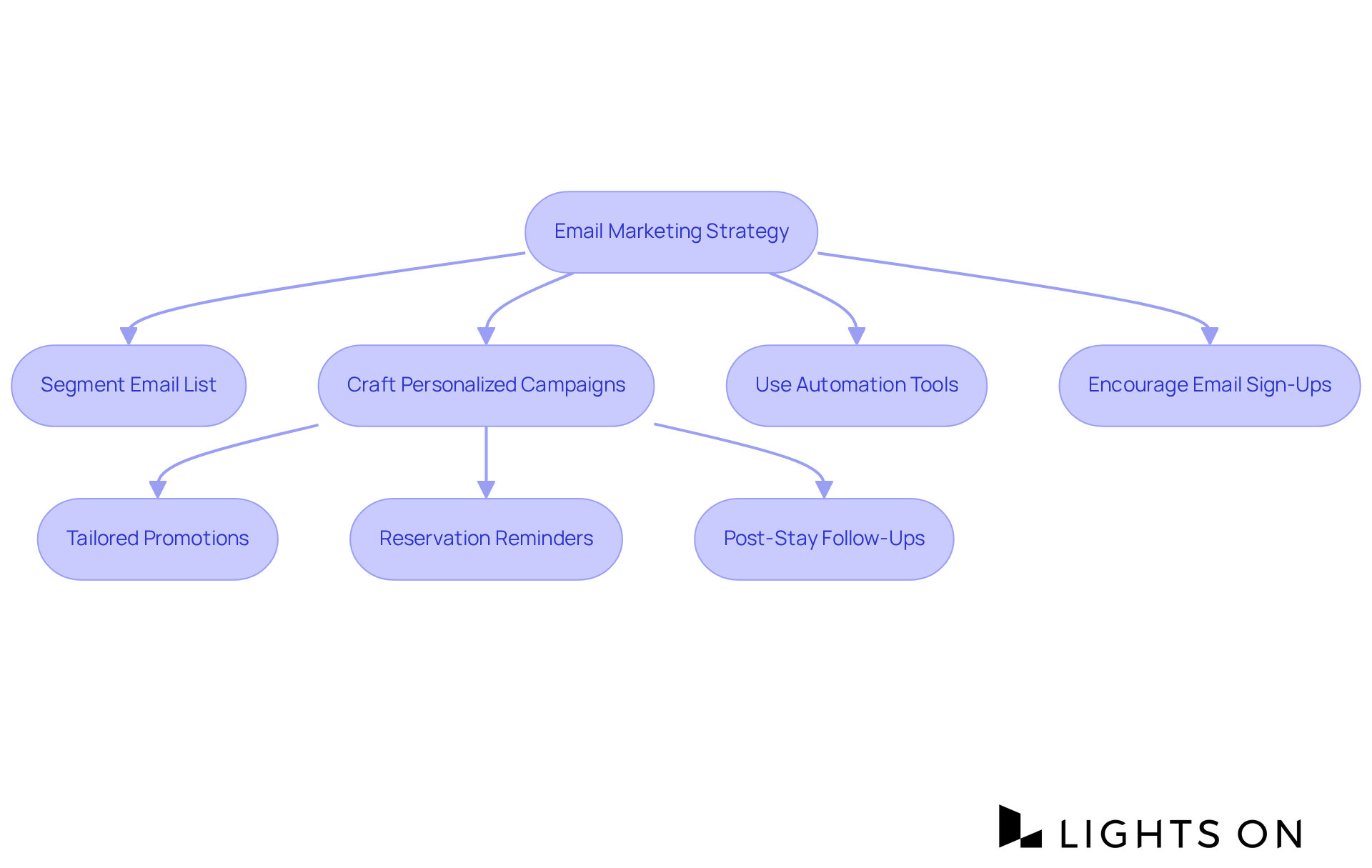
Incorporating 'buy now, pay later' (BNPL) options into your booking process can significantly enhance the visitor experience. This innovative payment model enables guests to secure their reservations without the immediate financial burden, fostering a smoother commitment to their stay.
By offering flexible payment solutions, accommodations can attract a broader spectrum of guests, particularly younger travelers who prioritize financial planning. Notably, nearly 25% of Gen Z consumers are utilizing BNPL, underscoring its importance for hotels aiming to connect with this demographic.
This strategy not only boosts reservation rates but also cultivates greater guest satisfaction and loyalty. Hotels that embrace flexible payment methods have reported remarkable increases in reservation fulfillment rates, with some experiencing a surge of up to 70% year-on-year.
As the demand for accessible travel options continues to rise, adopting such payment solutions is becoming essential for accommodations striving to thrive in a competitive market.
To effectively implement BNPL options, property owners should consider:
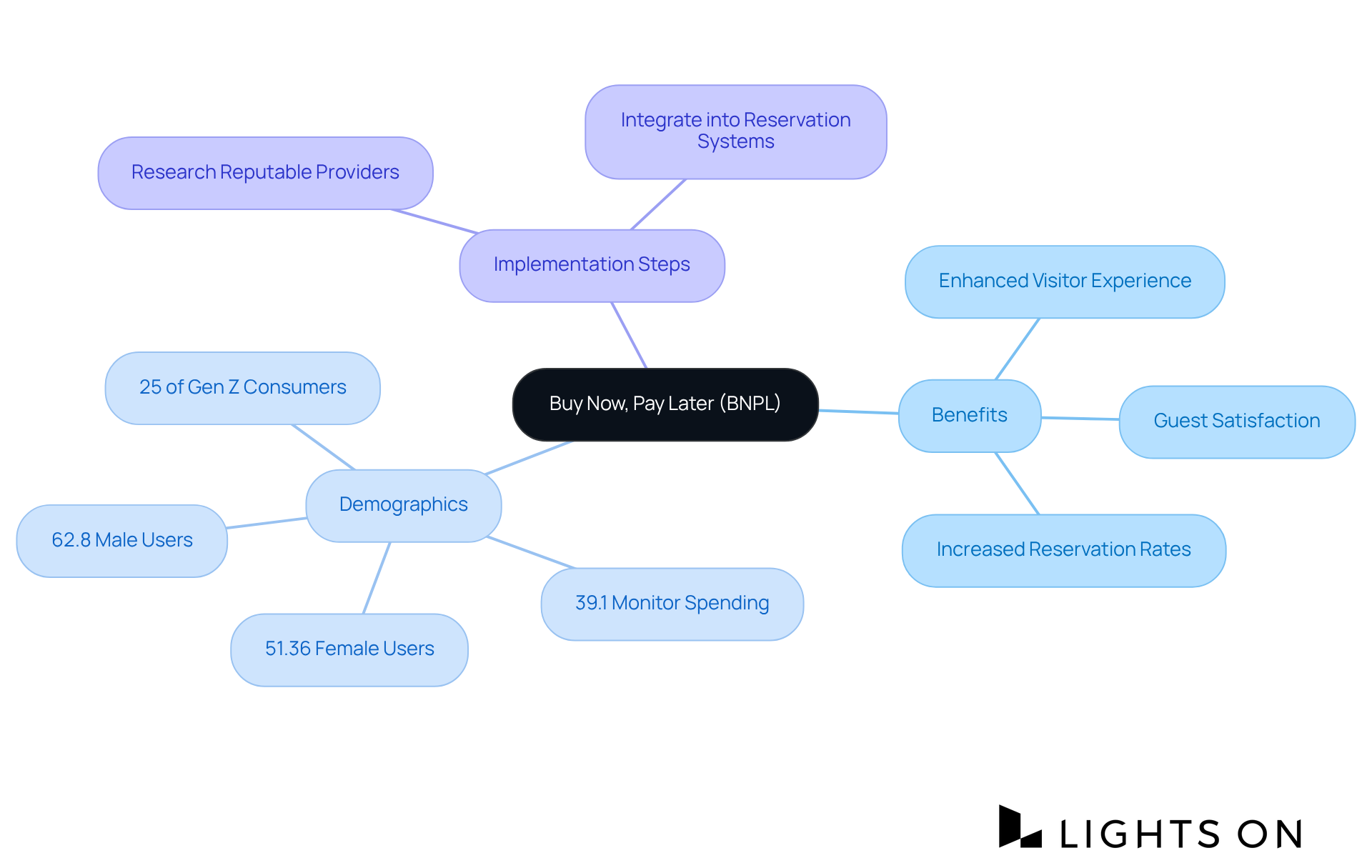
Partnering with travel influencers can significantly transform hotel marketing strategies. Influencers excel at creating authentic content that showcases your property, driving awareness and interest among their followers.
When selecting influencers, prioritize those whose audience aligns with your target market; this alignment is crucial for maximizing impact. Working together on distinctive experiences, such as or special events, not only creates excitement but also promotes reservations.
Furthermore, leveraging micro-influencers offers a cost-effective approach to reach niche audiences, enhancing engagement and fostering a sense of community around your brand. With 28% of travelers reserving accommodations based on influencer suggestions, the potential for increased reservations through these partnerships is considerable.
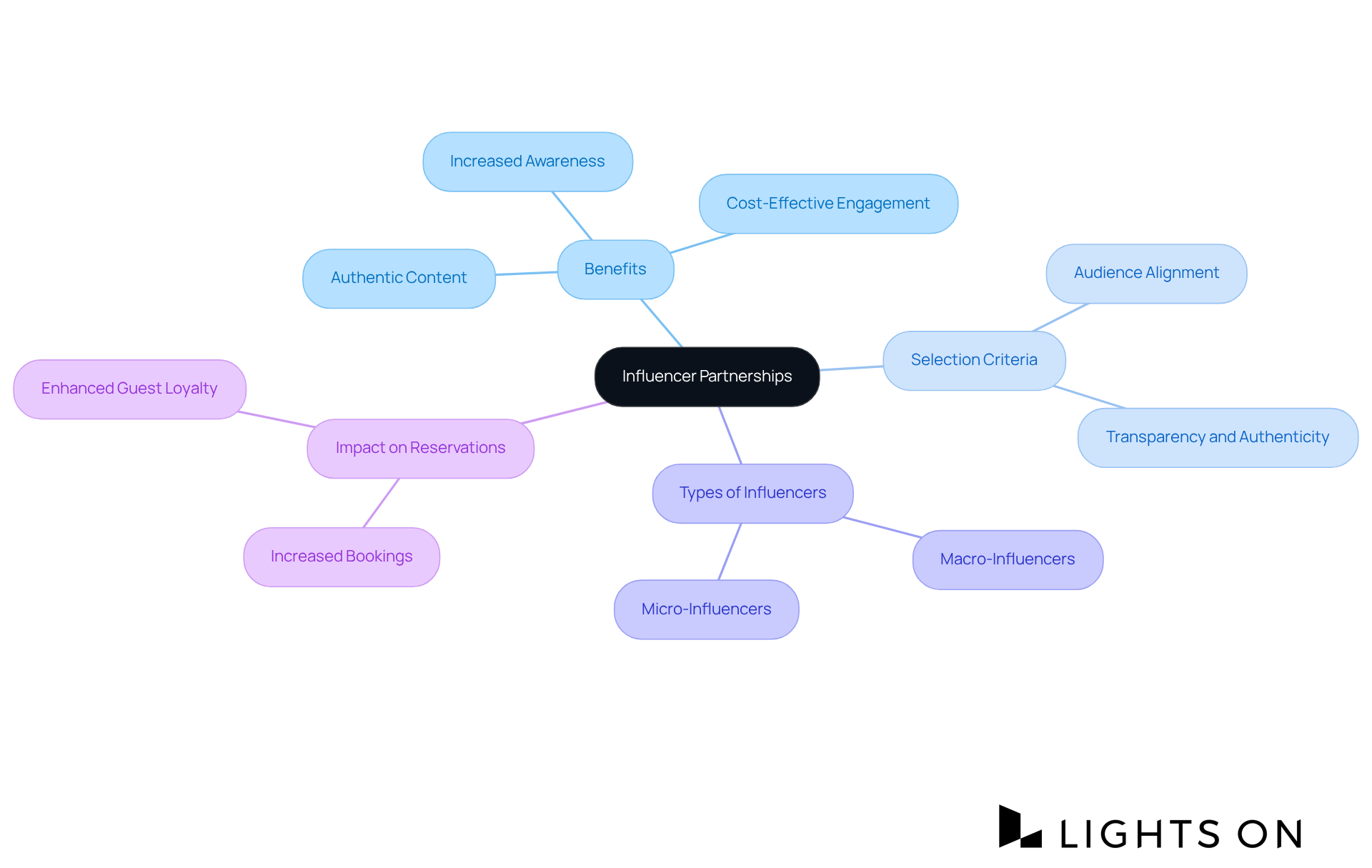
Establishing a robust loyalty program is essential for enhancing customer retention and driving repeat reservations. By offering enticing incentives such as discounts, complimentary nights, or exclusive amenities, hotels can motivate visitors to return. Research shows that even a modest 5% increase in customer retention can lead to a remarkable 25% increase in profits, highlighting the financial advantages of effective loyalty strategies.
Customizing the loyalty experience to align with individual preferences significantly enhances satisfaction and fosters loyalty. Furthermore, actively promoting your loyalty program through diverse hotel marketing digital channels, including gamified campaigns that have demonstrated effectiveness in generating leads, boosts visibility and participation.
As J. Willard Marriott wisely stated, "Motivate them, train them, care about them, and make winners out of them… they’ll treat the customers right."
To further elevate your loyalty program, consider implementing a feedback loop that allows guests to share their preferences and experiences, enabling you to effectively.

In the competitive landscape of hospitality, implementing effective digital marketing strategies is crucial for hotels aiming to increase bookings and enhance guest experiences. The integration of data-driven approaches, mobile optimization, and personalized marketing not only attracts potential guests but also fosters loyalty among returning visitors. By embracing these strategies, accommodations can significantly elevate their visibility and engagement in an ever-evolving market.
Key insights from the article highlight the importance of leveraging data analytics to tailor marketing efforts, ensuring that promotional strategies resonate with targeted demographics. Additionally, mobile-friendly websites and SEO enhancements emerge as vital components for driving traffic and improving online presence. Personalization, content marketing, and influencer partnerships further contribute to creating memorable experiences that encourage repeat visits and strengthen brand loyalty.
As the hospitality industry continues to adapt to changing consumer behaviors, embracing innovative strategies such as buy now, pay later options and robust loyalty programs can set hotels apart from their competitors. By prioritizing these digital marketing techniques, accommodations can not only boost their bookings but also cultivate lasting relationships with guests, ultimately leading to sustained success in the industry.
Why is data analysis important for hotel marketing?
Data analysis is crucial for hotels as it helps boost reservations and improve visitor experiences by tailoring offerings to customer preferences based on reservation trends and guest feedback.
What tools are recommended for monitoring customer behavior in hotel marketing?
Tools such as Google Analytics and advanced CRM systems are recommended for monitoring customer behavior, allowing hotels to refine their promotional strategies effectively.
How can predictive analytics benefit hotels?
Predictive analytics can lead to revenue growth of up to 10% by enabling hotels to adjust pricing and promotional tactics based on real-time demand forecasts.
What is the significance of audience segmentation in marketing campaigns?
Audience segmentation allows hotels to create targeted promotions that resonate with specific traveler demographics, increasing visibility and encouraging direct reservations, which can yield higher revenue than third-party platforms.
How can Lights On's Revenue Management Team assist accommodations?
During staffing transitions, Lights On's Revenue Management Team can provide temporary support by optimizing pricing and promotional strategies to sustain booking momentum.
What is a practical recommendation for hotels regarding data analytics?
Hotels should consider instituting a routine review of their data analytics to uncover trends and adapt their strategies accordingly to remain competitive.
Why is mobile optimization important for hotel websites?
Mobile optimization is essential because, by 2025, a mobile-friendly website is necessary for enhancing user experience, facilitating navigation, and encouraging potential visitors to complete reservations.
What are key aspects to incorporate for mobile optimization?
Key aspects include quick loading times, easily accessible contact details, and a streamlined reservation process.
How can integrating mobile payment options benefit hotels?
Integrating mobile payment alternatives can enhance the reservation experience and encourage more patrons to finalize their bookings while on the move.
What strategies can hotels use to enhance online visibility?
Hotels should prioritize search engine optimization, focusing on local SEO, using relevant local keywords, and producing high-quality content to attract potential visitors.
Why is it important to optimize a Google Business Profile?
Claiming and optimizing a Google Business Profile is essential as verified profiles can attract an average of 1,803 search views and approximately 200 actions monthly.
How does responding to guest reviews impact hotel bookings?
Establishments that respond to 40-45% of guest reviews can generate up to 2.2 times more booking income, significantly elevating their search rankings.
Transform your group booking strategies with Lights On and watch your occupancy soar.